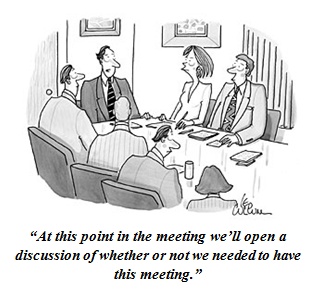There you are, attending another meeting struggling to stay engaged. Why? We want to be there (but our mind is wandering), we're interested in the reason it's taking place (but the slides are so boring) & most importantly we're ready to participate (if we ever get asked). This all too familiar scene seems to plague us even with so many great ideas floating around to make it better. Transparency of information & the speed at which it flows can make all the difference in focusing on what's important now.
The great management guru Peter Drucker informs us in his many writings that one can either meet or work, one cannot do both. Sage advice! Why then, are meetings often unproductive? We all have asked this, been frustrated & even disappointed with how these seemingly "necessary" events seem to be such a time suck. In asking this question it leads our thoughts from a negative point of view. How can we be part of a positive solution for our situation? Here are some thoughts on time, discovering ideas to make it better & why we meet at all.
Why (do we meet)?
My favorite question! Answering it often leads to keeping things the same. Status quo is standing still & in today's full speed ahead work life isn't satisfactory. Let's take some advice from Ricardo Semler & ask 3 Why's in a row instead. This can apply to our individual role for the meeting, collective goal(s) & even whether or not we should meet at all. Semler says when we do this the first answer is pretty good, the second gets fuzzier & by the third, we don't really know why we're doing what we're doing. If you get 3 good answers he still advises to ask "What for?" It probably won't always be popular but every 6 months or so be the person who suggests...

*Cartoon from Pinterest.com
Make It Better
What ideas work? Over the years there have been some that have had success, after all, why can't meetings be fun? When meeting in person, Robert Townsend suggests having a round table instead of a rectangle so everyone is equidistant from one another. This encourages interaction & helps remove titles/responsibilities so ideas can compete on an even basis, like the internet. Try standing up. If nobody gets comfortable in those heavenly designed chairs the meeting won't last as long. Set an agenda & stick to it. Only the people who have something pertinent to the event will present. Then simply have a "one more chance" around the room to accommodate additional comments that may have arisen. Have a time-keeper. This can take the pressure off the "leader" of the meeting to keep things on track & focus on the purpose of getting together. This works well if you have an overall time limit. Another great focus tool is to take minutes. This scripting of the meeting keeps comments focused on recording it for reference. Be careful here, as misquoting can be common & can increase anxiety but for the right reason, you might find it helpful. Ricardo Semler suggests not putting pressure on a certain group of people to show up for any meeting. This is brilliant because after the purpose is defined, you really only need the folks who want to be engaged to attend. With this framework in mind, he also suggests having a couple seats open for whoever wants to attend. Literally anyone from the organization. Who knows, maybe their attendance will yield some "thought leadership" the typical group missed.
Related Stuff
"Time is what keeps everything from happening at once."
-Albert Einstein
Too obviously funny way of putting it! The only thing we all have in common is time so treat it like the precious commodity it is. One of my mentors framed it this way; if someone is late 5 minutes & kept 10 people waiting, that's 50 minutes of productive time wasted. Another epiphany moment & with such simple math even I can understand it! Show people you're not going to be cavalier with their time & they will freely give it to any project, from anywhere.
Idea Generation
Good ideas don't come while we're at work. Really? Why not? It's only when we're spending time away from the activities of work that our mind can begin to creatively ponder ideas, new ventures, risks, innovations, etc. Similar to when we try hard to remember something. When we aren't trying it magically comes to us! If we as leaders can help instill a "thinking" culture instead of on a "knowing" culture we'll move in the intuitive direction. When we feel the pressure to have all the answers all the time it promotes a culture of "certainty" & when we're certain things will happen the way we think it sets current & future projects up for failure.
There's nothing new here, just some thoughts on the challenge we all have to stay connected with our passions to move any enterprise forward. Hope this helps in some small way with the "problem" of meetings so we can love all the work we do...even meetings!

Comments (1)